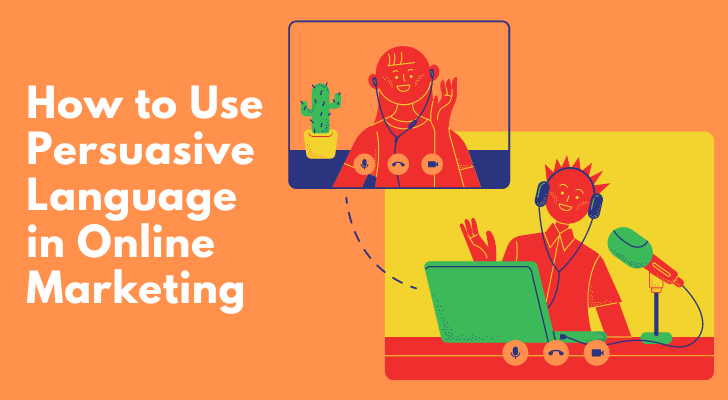When it comes to online advertising and marketing, there’s one key rule that you must always remember: persuasive language sells. Mastering the art of persuasive copywriting can be a challenge.
You need to be able to get readers hooked and keep them engaged. You also have to make sure that your messages are persuasive enough that people actually act on them… But don't worry - with the right strategies, you can become an expert at leveraging your words for maximum impact. I’m going to share how to write persuasive content for online marketing with you, and show you how to use particular techniques that will help you achieve good results.

What Is Persuasive Language?
When you’re trying to persuade someone to do something, it’s important to use language that will resonate with them. This means using language that will appeal to their emotions and make them see the benefits of taking the action you want them to take.
Some persuasive language techniques you can use in your online marketing include:
1. Use “you” statements
When you're trying to persuade someone of something, it's important to use language that will resonate with them on a personal level. One way to do this is to use so-called "you statements."
These are phrases that direct the message toward the listener, making them feel like you're speaking directly to them.
For example, instead of saying "People who drive fast are more likely to have accidents," you could say "If you drive too fast, you're more likely to get into an accident."
“You” statements are powerful because they create a sense of intimacy and connection between speaker and listener. They make the listener feel like they're part of the conversation, not just someone who's being talked at. And when people feel connected to what you're saying, they're more likely to be persuaded by your argument.
So if you want to convince someone of something, make sure to use plenty of "you" statements in your language. It could make all the difference in whether or not they end up agreeing with you.
2. Make promises and guarantees

When you make a promise, you are essentially making a commitment to someone. This commitment can be big or small, but it is important to follow through on your promises. Otherwise, you risk damaging your credibility and relationships.
So use language that is clear, concise, and convincing. You want to make sure that your listener understands what you are saying and believes that you will follow through on your commitments.
Some ways to use persuasive language when making promises include:
- Use strong verbs: "I guarantee that…” “Believe me,” “I assure you…"
- Be specific: "I promise to email you back within 6 hours from now."
- Make it personal: "I give you my word that I will always be there for you."
- Be sincere: "I truly believe that this product will help you."
Making promises is not something to be taken lightly. But if done correctly, they can be very powerful and influential. When making a promise, remember to use persuasive language in order to ensure that your listener understands and believes what you are saying.
3. Use strong verbs, adverbs, and adjectives that create a sense of urgency
Strong verbs, adverbs, and adjectives can be very persuasive, especially when they create a sense of urgency. Your argument will be much more compelling if you use them.
For example, if you are trying to convince someone to take action on a problem, saying "this needs to be fixed immediately" is much more effective than simply saying "this needs to be fixed."
Strong adjectives can also help to add emphasis to your argument. If you want to stress how important something is, you can use words like "critical" or "essential."
Some examples of strong verbs that convey urgency are "demand," "require," "insist," and "require."
So make sure to use these strong words wisely.
4. Be specific about what you want them to do
Persuasive language is all about using words to convince someone to do something. Your chances of success increase the more specific you are.
So, if you're trying to persuade your visitors to buy your product, be as specific as possible. Use language that will make it clear what you want them to do and why it's important.
For example, instead of saying "Buy Product A now", say "Click the button below to buy Product A now, so you can save money AND help the environment.”
The more specific you are, the more likely you are to get the results you want.
5. Use positive words and phrases that create a sense of hopefulness and excitement
The words we use can either help or hinder our cause, so it's important to choose them carefully. Positive words and phrases that create a sense of hopefulness and excitement can be particularly effective in persuasive language. They tap into our natural desire for good things and make us more likely to want to support the person or cause we're hearing about.
Some examples of positive words and phrases that can create a sense of hopefulness and excitement include: "breakthrough," "discover," "revolutionary," "solution," and "improvement."
These words can help to create a vision of a better future that we'll all want to be a part of. So if you're looking to persuade others, consider using some of these positive, hope-filled words and phrases.
How Can Persuasive Language Be Used in Online Marketing?
Persuasive language can be and should be used in marketing, to increase sales, encourage customer loyalty, and be authoritative within the industry.
Some common techniques in online marketing include;
1. Use positive words and phrases

Make sure the words you use throughout your marketing campaign are positive and upbeat. This will help create a favorable impression of your brand and products/services. Examples of positive words and phrases include: "amazing," "incredible," "unbeatable," "guaranteed," etc.
2. Use social proof
Social proof is a psychological phenomenon whereby people are more likely to do something if they see others doing it first. You can use this to your advantage by featuring testimonials, reviews, and customer case studies on your website and social media channels. This will show potential customers that others have had success with your products/services, which will make them more likely to convert themselves.
3. Make use of scarcity tactics
Scarcity is another psychological principle that can be leveraged in marketing campaigns. When something is scarce, people perceive it as being more valuable and are therefore more likely to want it. You can create a sense of urgency by using phrases such as "limited time only," "while supplies last," or "once in a lifetime opportunity."
Examples of persuasive language in online marketing
Some common persuasive language techniques include:
- Using strong, persuasive words that evoke emotion
- Making claims that are backed by evidence
- Using testimonials and social proof to validate your claims
- Framing your offer in a way that is irresistible
- Creating a sense of urgency
- Using scarcity to make people feel like they need to act now
How to Create Persuasive Content
The internet is a very competitive marketplace, and businesses need to stand out in order to succeed. One way to do this is to create persuasive content that convinces customers to buy from you. Here are some tips on how to create persuasive content:
- Use strong language that creates an emotional response.
- Make your arguments logical and easy to follow.
- Support your claims with evidence and data.
- Be confident in your language – avoid hedging or qualifiers.
- Pay attention to the overall structure of your piece - make sure it flows well and has a clear beginning, middle, and end.
Use Rhetorical Questions
A rhetorical question is a question that’s not seeking an answer, but is making an obvious statement, such as;
- Do you really want to waste so much money?
- Why would anyone work after 70 just to pay bills?
Use a Repetition Technique
Repeating the same phrase in a sales copy (or different phrases with the same meaning) is a popular marketing method. For example, “50% off!” “Half-price sale!”
Persuasion Techniques That Work
Some common persuasion techniques that work in online marketing are:
1. Use strong, persuasive language
This means using words that have a strong emotional appeal and convey a sense of urgency. For example, instead of saying "our product is the best" say "our product is the most effective."
2. Use images and videos
A picture is worth a thousand words, and this is especially true when it comes to online marketing. People are more likely to respond positively to visual stimulus, so using images and videos in your marketing campaign can be very effective.
3. Make use of social proof
When people see that others are using and enjoying your product or service, they are more likely to be persuaded to try it themselves. You can create social proof by featuring testimonials from satisfied customers on your website or sharing positive reviews from third-party websites.
4. Offer something for free

Everyone loves freebies! Offering a free trial or sample of your product or service is a great way to persuade people to give it a try.
5. Use scarcity tactics
Creating a sense of urgency can encourage people to take action now instead of putting it off until later. You can do this by running limited-time offers or highlighting that there is only a certain number of products available.
When to Use Persuasive Language in Online Marketing
By now, you know that if you use language that appeals to emotion and logic, you can more effectively influence your reader's decision-making process.
But it's also important to use persuasive language sparingly, as too much of it can come across as pushy or sales-y. In general, you should only use persuasive language when you're confident that it will lead to the desired outcome.
Some common instances where persuasive language can be used in online marketing include:
- Creating calls-to-action (CTAs) that encourage clicks and conversions (“Buy NOW!” “24 Hours Only”, “Get This Before It’s Too Late”)
- Writing product descriptions that highlight the unique value proposition.
- Creating compelling headlines and meta descriptions that drive traffic to your website.
When used correctly, persuasive language can be a powerful tool in your online marketing arsenal. Just remember to use it judiciously, and always keep your audience's best interests at heart. This can apply to any type - whether affiliate marketing, e-commerce, or even for non-profit businesses.
How to Use Persuasive Language in Online Marketing: Conclusion
To sum up, persuasive language plays an important role in online marketing. It can help you to get more leads and increase your sales by reaching out to your customers and convincing them that your product or service is the right choice for them. By using words with emotional appeals, such as ‘free’, ‘trustworthy’, ‘luxurious', and 'exclusive', you can create an effective message that captures people's attention and encourages them to take action. With a well-crafted copywriting campaign combining persuasive language with engaging visuals, there's no limit to what kind of success you can achieve!

